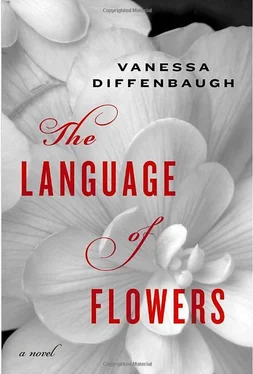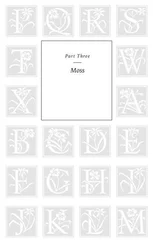“Then no.” She looked at me again, and her gaze was as unwavering as Elizabeth’s had once been. My throat tightened, and I clutched at my brown blanket petticoat, afraid it would come loose and pool at my feet.
“I’ll give you five dollars to unload my truck,” she said. I bit my lip and nodded.
It must be the leaves in my hair , I thought.
The bath wasalready drawn. It made me feel uneasy to think that Elizabeth knew I would arrive dirty.
“Do you need my help?” she asked.
“No.” The bathtub was sparkling white, the soap nestled among seashells in a reflective metal dish.
“Come down when you’re dressed, then, and be quick.” A clean outfit was arranged for me on a white wood vanity.
I waited until she left, tried to lock the door behind her, and saw that the lock had been removed. I pulled the small chair from the vanity and propped it under the doorknob, so at the very least I would hear her coming. Taking my clothes off as fast as I could, I submerged myself in the hot water.
When I came back downstairs, Elizabeth was sitting at the kitchen table, her food untouched and her napkin on her lap. I was dressed in the clothes she had purchased, a white blouse and yellow pants. Elizabeth looked me over, undoubtedly taking in their enormity. I had rolled the pants down at the waist and up at the legs, and still they hung low enough to show my underwear, if my shirt hadn’t been so long. I was a head shorter than most of the girls in my third-grade class, and I had lost five pounds earlier in the summer.
When I told Meredith the reason for my weight loss she’d called me a liar, but she pulled me from the home anyway, launching a formal investigation. The judge listened to my story and then to Ms. Tapley’s. I will not be made a criminal for refusing to cater to the demands of a picky eater , she had written in her testimony. The judge proclaimed the truth to lie somewhere in the middle, his eyes on me stern and accusing. But he was wrong. Ms. Tapley was lying. I had more faults than Meredith could list on a court report, but I was not a picky eater.
For the entire month of June, Ms. Tapley had made me prove my hunger. It started on my first day in her home, the day after school let out. She helped me unpack my things in my new room and asked, in a voice kind enough to arouse my suspicion, to know my favorite and least favorite foods. But I answered anyway, hungry: pizza, I said, and frozen peas. For dinner that night, she served me a bowl of peas, still frozen. If I was truly hungry, she said, I would eat it. I walked away. Ms. Tapley locked the refrigerator and all the kitchen cabinets.
For two days I left my room only to use the bathroom. Cooking smells pushed under my door at regular intervals, the phone rang, and the TV grew louder and softer. Ms. Tapley did not come to me. After twenty-four hours I called Meredith, but my reports of starvation were so common that she did not return my call. I was sweating, shaking, when I returned to the kitchen table on the third night. Ms. Tapley watched my weak arms attempt to pull the heavy chair away from the table. Giving up, I slid my paper-thin body into the crack between the table and the back of the chair. The peas in the bowl were shriveled and hard. Ms. Tapley glared at me over the top of a dish towel as grease popped on the stove, lecturing me about foster kids eating because they were traumatized. Food is not for comfort , she said as I placed the first pea in my mouth. It rolled down my tongue and stuck in my throat like a pebble. Swallowing hard, I ate another, counting each pea as it went down. The smell of grease and something frying kept me going. Thirty-six. Thirty-seven. After the thirty-eighth pea, I vomited them back into the bowl. Try again , she said, gesturing to the half-digested peas. She sat down on a bar stool in the kitchen and pulled steaming meat out of the pan, taking hot bites and watching me. I tried again. The weeks continued this way until Meredith came for her monthly visit; by then the weight was already lost.
Elizabeth smiled as I entered the kitchen.
“You are beautiful,” she said, not attempting to conceal the surprise in her voice. “It was hard to tell underneath all that ketchup. Do you feel better?”
“No,” I said, though it was not the truth. I couldn’t remember the last home that allowed me to use the bathtub; Jackie may have had one upstairs, but kids were not permitted on the second floor. Before that was a long series of small apartments, the narrow shower stalls crowded with beauty products and layers of mold. The hot bath had felt good, but now, looking at Elizabeth, I wondered what it would cost me.
Climbing up onto a chair, I sat at the kitchen table. Set out was enough food for a family of six. Big bowls of pasta, thick slices of ham, cherry tomatoes, green apples, American cheese stacked in clear plastic sleeves, even a spoon full of peanut butter on a white cloth napkin. It was too much to count. My heart beat audibly; my lips curled into my mouth, and I bit my upper and lower lip together. Elizabeth would force me to eat everything on the table. And for the first time in months, I wasn’t hungry. I looked up at her, waiting for the command.
“Kid food,” she said, gesturing to the table shyly. “How did I do?”
I didn’t say anything.
“I can’t imagine you’re hungry,” she said, when she could see that I wasn’t going to respond. “Not if your nightgown was evidence of your afternoon.”
I shook my head.
“Eat only what you want, then,” she said. “But sit at the table with me until I’ve finished.”
I exhaled, momentarily relieved. Dropping my eyes to the table, I noticed a small bouquet of white flowers. It was tied with a lavender ribbon and placed on top of my bowl of pasta. I studied the delicate petals before flicking it off my food. My mind filled with stories I’d heard from other children, tales of poisoning and hospitalizations. I glanced around the room to see if the windows were open, in case I needed to run. There was only one window in the room of white wood cabinets and antique appliances: a small square above the kitchen sink, with miniature blue glass bottles lining the windowsill. It was shut tight.
I pointed to the flowers. “You can’t poison me, or give me medicine I don’t want, or hit me—even if I deserve it. Those are the rules.” I glared across the table when I said it and hoped she felt my threat. I had reported more than one person for spanking.
“If I were trying to poison you, I would give you foxglove or hydrangea, maybe anemone, depending on how much pain I wanted you to feel, and what message I was trying to communicate.”
Curiosity overcame my dislike of conversation. “What’re you talking about?”
“These flowers are starwort,” she said. “Starwort means welcome . By giving you a bouquet of starwort, I’m welcoming you to my home, to my life.” She twirled buttery pasta on her fork and looked into my eyes without a glimmer of humor.
“They look like daisies to me,” I said. “And I still think they’re poisonous.”
“They aren’t poisonous, and they aren’t daisies. See how they only have five petals but it looks like they have ten? Each pair of petals is connected in the center.” Picking up the small bouquet of flowers, I examined the little white bundle. The petals grew together before attaching to the stem, so that each petal was the shape of a heart.
“That’s a characteristic of the genus Stellaria ,” Elizabeth went on, when she could see that I understood. “Daisy is a common name, and spans many different families, but the flowers we call daisies typically have more petals, and each petal grows separate from the others. It’s important to know the difference or you may confuse the meaning. Daisy means innocence , which is a very different sentiment than welcome. ”
Читать дальше












